What is it?
The Internet of Things (IoT) refers to a network of objects, linked by sensors, which can transmit information to each other without the need for human interaction. Objects like an everyday fridge can be fitted with an IP address and sensor and then linked up to your Internet shopping account. Therefore, when you run out of milk, your fridge will tell your Tesco account and hey presto, new milk will be delivered without you lifting a finger.
How does it work?
Objects are fitted with a sensor, which can cost as little as £1 to buy and fit. This sensor has an IP address and connects information that it gathers to a remote server. In this way information is passed from device to device. The sensors can be very small and hidden out of the way; nobody need ever know that your appliances are wirelessly talking to each other.
When is this going to happen?
It has already started. A primitive version of the fridge sensor is on sale for £2,000 and Nike is selling trainers which can monitor your performance and automatically upload the results online. However, most of the terminology is focused on the future and the IoT is still in its relatively early stages. Although there are currently more than 10 billion wirelessly connected devices, and it is estimated that this will increase to over 30 billion in the next six years, not all of these devices know how to talk to each other yet. Cars don't have a way to talk to tollbooths, for example. This means that we’re still a while away from everything being connected although the IoT has begun to take shape.
How did it all start?
The idea of the IoT has been around since the early 1980s. A coke machine at an American university was linked up to the Internet and programmers could check if their drink was in stock before visiting the machine. The advent of smartphones with apps that track elements of our daily lives has sped up the process and the number of connected devices has increased year by year. It is now estimated that there are at least two connected devices for every human on earth.
How will this affect everyday life?
Companies who have invested a lot of time and money into the IoT claim that our lives will be transformed for the better by it. In theory, manufacturers will no longer run out of stock or have excess stock as their product levels will be monitored automatically by sensors. Green campaigners say it will decrease carbon emissions through the collation of information and communication technology. Those in the healthcare sector also say that people’s health and well-being will improve as medical healthcare and medication will become connected.
How will it affect our business?
With more and more objects connected to the web, the IoT is expected to produce huge volumes of data. Every piece of equipment, and even employees, can be linked to a network by a sensor with info continually sent to a smartphone or browser. This will be present huge challenges in managing the data collected but, if analysed correctly, the data could provide information on how to improve processes and highlight new business opportunities. The IoT will also allow businesses to target their customers more effectively as more data will be available about their individual lives.
What other challenges does the IoT present?
The government has committed £73m in total to UK technology firms who are working on devices that can communicate over the Internet. The IoT is also seen as largely positive by businesses and technology firms. However, there have been concerns over privacy, with many people questioning where all the data gathered from the appliances in their lives will end up and how it will be used. Security is another key issue as the connected devices and their data could potentially be susceptible to hacking.
What is it?
The Internet of Things (IoT) refers to a network of objects, linked by sensors, which can transmit information to each other without the need for human interaction. Objects like an everyday fridge can be fitted with an IP address and sensor and then linked up to your Internet shopping account. Therefore, when you run out of milk, your fridge will tell your Tesco account and hey presto, new milk will be delivered without you lifting a finger.
How does it work?
Objects are fitted with a sensor, which can cost as little as £1 to buy and fit. This sensor has an IP address and connects information that it gathers to a remote server. In this way information is passed from device to device. The sensors can be very small and hidden out of the way; nobody need ever know that your appliances are wirelessly talking to each other.
When is this going to happen?
It has already started. A primitive version of the fridge sensor is on sale for £2,000 and Nike is selling trainers which can monitor your performance and automatically upload the results online. However, most of the terminology is focused on the future and the IoT is still in its relatively early stages. Although there are currently more than 10 billion wirelessly connected devices, and it is estimated that this will increase to over 30 billion in the next six years, not all of these devices know how to talk to each other yet. Cars don't have a way to talk to tollbooths, for example. This means that we’re still a while away from everything being connected although the IoT has begun to take shape.
How did it all start?
The idea of the IoT has been around since the early 1980s. A coke machine at an American university was linked up to the Internet and programmers could check if their drink was in stock before visiting the machine. The advent of smartphones with apps that track elements of our daily lives has sped up the process and the number of connected devices has increased year by year. It is now estimated that there are at least two connected devices for every human on earth.
How will this affect everyday life?
Companies who have invested a lot of time and money into the IoT claim that our lives will be transformed for the better by it. In theory, manufacturers will no longer run out of stock or have excess stock as their product levels will be monitored automatically by sensors. Green campaigners say it will decrease carbon emissions through the collation of information and communication technology. Those in the healthcare sector also say that people’s health and well-being will improve as medical healthcare and medication will become connected.
How will it affect our business?
With more and more objects connected to the web, the IoT is expected to produce huge volumes of data. Every piece of equipment, and even employees, can be linked to a network by a sensor with info continually sent to a smartphone or browser. This will be present huge challenges in managing the data collected but, if analysed correctly, the data could provide information on how to improve processes and highlight new business opportunities. The IoT will also allow businesses to target their customers more effectively as more data will be available about their individual lives.
What other challenges does the IoT present?
The government has committed £73m in total to UK technology firms who are working on devices that can communicate over the Internet. The IoT is also seen as largely positive by businesses and technology firms. However, there have been concerns over privacy, with many people questioning where all the data gathered from the appliances in their lives will end up and how it will be used. Security is another key issue as the connected devices and their data could potentially be susceptible to hacking.
 Stuart Ellen, Managing Director, Registration Services
Stuart Ellen, Managing Director, Registration Services
Stuart Ellen, Managing Director, Registration Services commented, "Equiniti holds vast amounts of data in respect of clients shareholders and employees so we are reviewing opportunities this technology might provide for the future. The Internet celebrated its 25th birthday recently, and it has come a very long way in such a short space of time. The Internet of Things is yet another exciting technological development for the web and it has real power to transform our working lives. The fact that the government is investing so much money in the technology attests to how influential it could become.
David Cameron calls it a ‘new revolution’ and believes that it could boost productivity, reduce energy needs and tackle climate change. There are concerns over security and managing the wealth of data that the IoT will bring, but if those problems are solved, who knows where it could take us? Gartner, a US research firm, predicts that there could be 26 billion devices connected to the IoT by 2020. I’m looking forward to seeing how it will develop in the coming years.”

